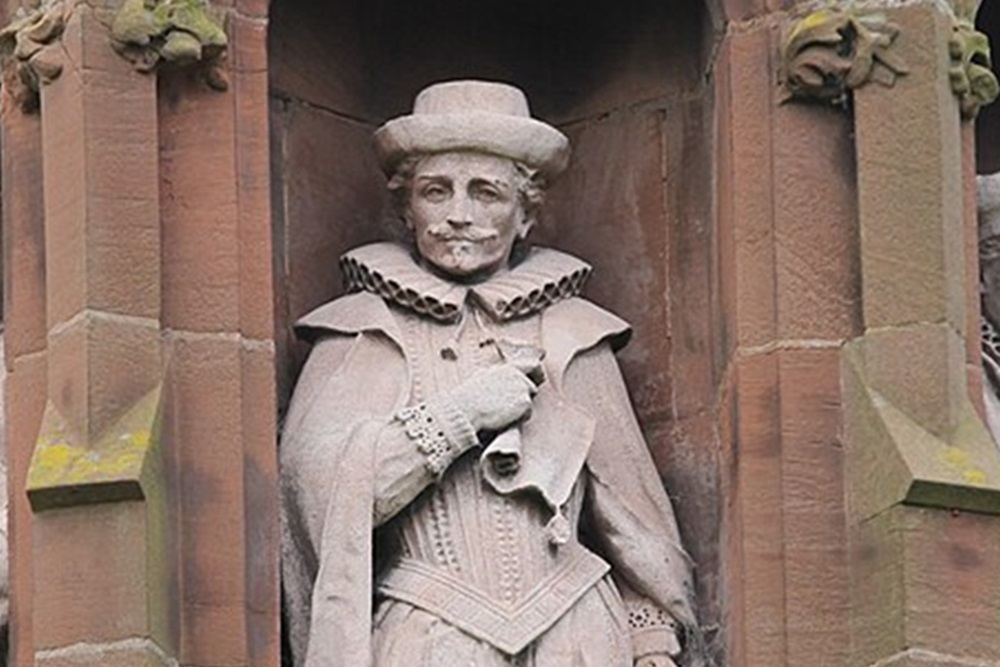Yr Hen Iaith part forty: Welsh Humanism

We continue the history of Welsh literature as Jerry Hunter guides fellow academic Richard Wyn Jones through the centuries in a series of lively podcasts. This article complements episode 40.
Jerry Hunter
In the introduction to his 1547 English-Welsh dictionary, William Salesbury addresses a special kind of reader, defined as y rhai sydd â mawrddysg gennych ac a wyddoch rhag mor werthfawr yw Dysg, ‘those who have great learning and who know how valuable Learning is’.
He asks this learned readership to help educate others: ‘in the manner in which little ones are fed with bread and milk’ (modd yr abwydir rhai bychain â bara a llaeth), so they should ‘nourish’ ([p]orthi) ‘the unlearned ones’ (yr annysgedig) ‘with the soft morsels of your exalted learning’ (â mwydion eich goruchelddysg).
Learning is to be introduced to less privileged Welsh people in a way mimicking the weaning of babies.
In this one sentence William Salesbury uses the word dysg three times, twice in compound nouns (mawrddysg, ‘great learning’ and goruchelddysg, ‘exalted learning), and once capitalized as Dysg, ‘Learning’.
There is no mistaking what’s at stake here. While the Welsh terms dyneiddiaeth (‘humanism’) and Dadeni Dysg (‘the Renaissance’) would not be coined until the twentieth century, it’s clear that a distinctly Welsh manifestation of Renaissance humanism is evident by the middle of the sixteenth century.
Salesbury and other university-educated humanists sought to introduce new ideas about the nature and uses of learning, and central to this intellectual agenda was a desire to ensure that the Welsh language was a medium capable of treating all kinds of learning.
That one-syllable noun, dysg, became what we might call a sixteenth-century buzzword. As the word dyneiddiwr (‘humanist’) didn’t exist in the sixteenth century, how might William Salesbury’s contemporaries referred to him? The answer is simple: as ‘a man of learning’, dyn o ddysg.
In the previous episode, we considered the first Welsh book every printed, Yny lhyvyr hwnn. The appearance of this and other early Welsh publications can be contextualized by considering three overlapping factors: the emergence of the printing press itself, the Protestant Reformation and humanism.
In this episode we’re focussing on the last of those three factors. As we use the words ‘humanism’, ‘humanist’ and ‘humanistic’ today in a variety of ways, it’s essential that we define what we mean when we’re talking about a humanist such as William Salesbury.
It’s best thought of as a formal qualification, conferred by formal study at university. The subjects were described in Latin as studia humanitatis – ‘the humanity studies’ or ‘the humanities’ – focusing to a great extent on the classical languages, ancient Greek and Latin, and including grammar, rhetoric, poetry, history and moral philosophy.
The term ‘Renaissance’, literally meaning ‘rebirth’, refers to the ways in which the artistic, linguistic and intellectual wealth of the ancient Greek and Roman worlds were being ‘reborn’ in Europe.
Broadly speaking, we can say that European humanists were engaged in two very different kinds of linguistic rebirthings.
The first focused on the rebirth of Latin as a written language, seeking to emulate the stylistic mastery of ancient authors.
The second focused on the renewal of the vernacular languages; humanists, having studying Greek and Latin in depth at university, then turned to consider their own native tongues and found them lacking in comparison.
In a very real sense, William Salesbury and other Welsh humanists were concerned with the future of their native language.
They wanted to ensure that Welsh was a medium fit for purpose, a language which could be used to discuss any possible subject, a language into which any work of writing – including the one which Protestant humanists such as Salesbury considered the most important, the Bible – could be translated effectively.
It’s important to stress one simple fact: Wales had no universities at the time. Creating two of them had been part of Owain Glyndŵr’s plan, but his fifteenth-century rebellion failed, and Wales would have to wait until the nineteenth century before its own universities would be established.
William Salesbury studied at Oxford, as did Richard Davies, with whom Salesbury would work closely while translating the New Testament. Other humanists, including Edmwnd Prys and Elis Prys, studied at Cambridge.
Some also studied on the continent; for example, Siôn Dafydd Rhys, having already studied at Oxford, graduated as a doctor of medicine at Siena.
The university education acquired by Welsh humanists was a potent link between Welsh literary circles and intellectual life in other European countries.
One of the most interesting things about sixteenth-century Welsh literature is that two very different kinds of literati were working in – and on behalf of – the Welsh language.
The university-educated humanists were the newcomers, men bringing new ideas gleaned in foreign institutions attempting to rework their native language in keeping with ideas and standards fashionable in intellectual circles outside of Wales.
The other kind was the Welsh bards, professional poets trained in a traditional manner who maintained a centuries-old and distinctly Welsh kind of literary culture.
Both humanist and bard were highly trained. Both could boast of professional qualifications.
But they often had very different ideas regarding the future of Welsh literature.
Darllen Pellach / Further Reading:
Paul Oskaar Kristeller, Renaissance Thought and the Arts (1964).
Branwen Jarvis, ‘Welsh Humanist Learning’ in R. Geraint Gruffydd (gol.), A guide to Welsh literature c.1530-1700 (1976).
Support our Nation today
For the price of a cup of coffee a month you can help us create an independent, not-for-profit, national news service for the people of Wales, by the people of Wales.






